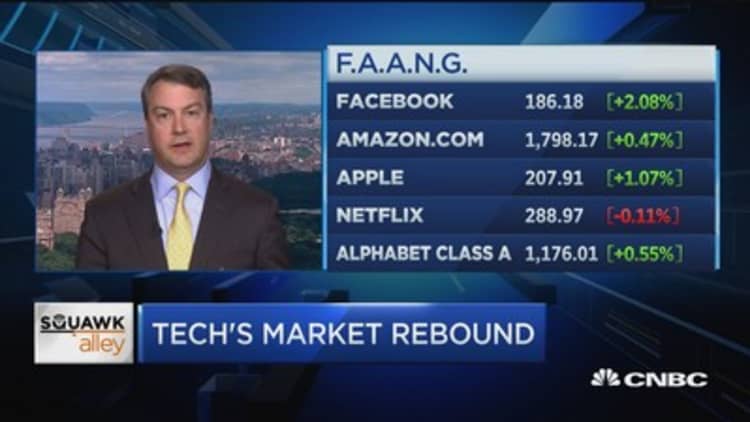
Stocks rose sharply on Wednesday as tensions in Hong Kong between the government and protesters eased after the withdrawal of a controversial bill.
The Dow Jones Industrial Average closed 237.45 points higher, or 0.9% at 26,355.47. The S&P 500 gained 1.1% to close at 2,937.78, led by a 1.7% surge in the tech sector. The Nasdaq Composite advanced 1.3% to 7,976.88.
Wednesday's gains come after the major indexes posted solid losses in the previous session. The Dow dropped 285 points on Tuesday while the Nasdaq and S&P 500 slid 1.1% and 0.7%, respectively.
Micron Technology was among the best-performing tech stocks, rising 4.1% after an analyst at Mizuho Securities raised his price target on the chipmarker. Intel was the best-performing stock in the Dow, rising 4.1%.
Bank stocks got a boost as the U.S. yield curve uninverted, with the 10-year rate trading above its 2-year counterpart. Bank of America and Citigroup gained more than 1.3% each while J.P. Morgan Chase advanced 1.2%.
Hong Kong leader Carrie Lam said that she will withdraw a contentious extradition bill that has sparked months of mass protests. The Hang Seng index in Hong Kong soared around 4% on reports overnight that the withdrawal of the bill was imminent. The iShares MSCI Hong Kong ETF (EWH) gained 4.5% and posted its biggest one-day rise since Sept. 8, 2015 when it rose 5.4%.
The bill's withdrawal is seen as a positive because protest escalation was seen as a potential disruptor to the global economy. Some investors feared the protests could hinder U.S.-China trade talks.
"While the initial response to Lam's speech was a thumbs down, with the main dispute taken off the table things should calm down," said Peter Boockvar, chief investment officer at Bleakley Advisory Group. "The big picture issues though remain between the two and will only intensify further in coming years as we approach the 2047 handover but for now, move on."
Earlier Wednesday, a report showed growth in China's services sector had expanded at its fastest rate in three months in August, despite broader economic headwinds.
The Caixin/Markit Services Purchasing Managers' Index (PMI) came in at 52.1 in August — its highest reading since May. The 50-mark in PMI readings separates growth and contraction.
"This is an easing of economic woes in China," said Peter Cardillo, chief market economist at Spartan Capital Securities. This is "triggering a relief rally after yesterday's declines."
At the start of the month, the U.S. and China imposed new tariffs on one another's goods. It marked the latest escalation in a long-running trade war between the world's two largest economies.
Sentiment also got a boost after New York Federal Reserve President John Williams said in a speech the central bank will act as appropriate to sustain the current economic expansion. He added that low inflation is "is indeed the problem of this era" and that it is "a reflection of the broader economic picture."
Brexit
In Europe, a cross-party alliance of rebel lawmakers defeated British Prime Minister Boris Johnson in parliament on Tuesday, moving to prevent him from taking the country out of the European Union without a formal agreement on October 31.
It prompted the new prime minister to announce he would immediately push for a snap election.
Sterling has since pared some of its recent losses against the U.S. dollar. The U.K. currency gained 0.9% to climb above $1.21 Wednesday, after falling to its lowest level since October 2016 in the previous session.
—CNBC's Sam Meredith contributed to this report.


